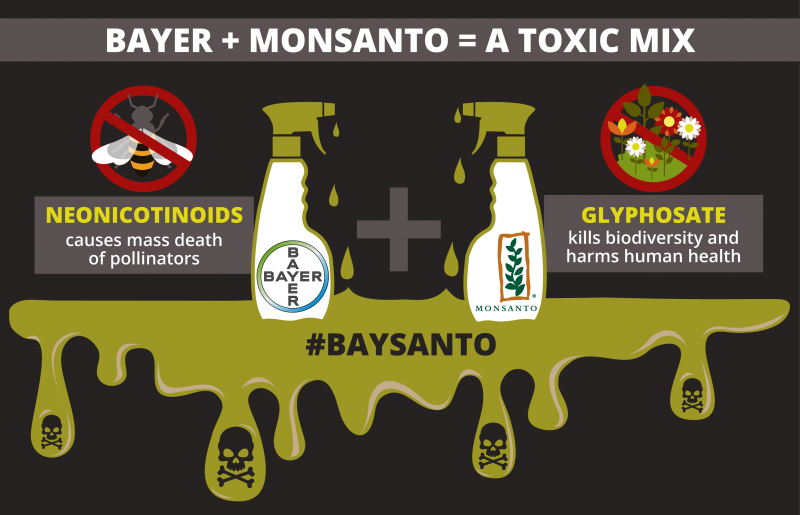
A match made in hell
Six reasons why a Bayer-Monsanto merger threatens people & planet
A toxic mix
Although widely used across the world, many Bayer and Monsanto products are highly toxic for people and planet – an ironic illustration of our broken global food system.
One kind of problematic Bayer insecticides are the so-called ‘neonicotinoids’, whose active ingredients are a main driver of the large-scale death of bees and other pollinators. Although this has horrendous consequences for ecosystems and food production, Bayer is unwilling to relent and has started an outright lobby war to overturn a partial ban in the EU.
By the advice of EU food safety agency EFSA, the partial ban was issued for three neonicotinoids in 2013, which led Bayer to hire ‘product defense company’ Exponent to attack the scientific evidence underlying the ban. Right now, Bayer is suing the European Commission to see this partial ban overturned. But its war on science looks set to be in vain: the EU is expected to announce a complete ban on neonics this year. In an attempt to at least limit reputational damage, the company is running ‘Bayer Bee Care Centers’ - a glaringly obvious greenwashing inititive.
For Monsanto, its biggest worry is also its biggest cash cow: glyphosate, the active ingredient in its flagship weedkiller RoundUp, was found to ”probably cause cancer in humans” by the World Health Organisation. Still, its wide-spread use means glyphosate residue can now even be found in human urine and breastmilk. This year the EU has to decide whether to grant another 10-year market authorisation for glyphosate-based weed killers – given the WHO findings, an EU ban of the substance should be beyond debate.
But Monsanto has been trying to rubbish the scientific evidence against its product and insisted the WHO study on glyphosate was “junk science”, as well as running the industry lobby group ‘Glyphosate Task Force’. Although the EU agencies for food safety and chemicals already concede that glyphosate can seriously damage sight and has long-lasting toxic effects on aquatic life, they reject its likely carcinogenic characteristic in humans. Tellingly, these EU risk assessments are based on Monsanto-owned studies that are not fully available for independent scrutiny and were not compiled by independent scientists. Trying to make the voice of civil society heard against this corporate capture of science, almost 1,5 million people signed a petition to ban glyphosate and a European Citizens’ Initiative has been launched to the same aim.
Lobby spending
In the EU and the US, both Bayer and Monsanto have to declare their lobby spending in so-called transparency registers. But these figures only cover direct lobbying in the capitals. Many other costs lurk beneath the surface.
The US has a legally-binding register with a quarterly reporting requirement. In contrast, the EU transparency register is a voluntary instrument without any sanctions for misleading declarations, making the declared data highly unreliable and often unrealistic. Moreover, there are very few resources for verifying declarations, which renders it virtually impossible to trust the reported data.
Given these restraints of the EU register, the EU figures on the EU lobby spending of Bayer and Monsanto represent only the tip of the iceberg. According to Open Secrets, Monsanto’s lobbying in the US in 2015 amounted to an estimated $4,330,000, but the company only declared lobby spending of between €300,000 and 399,999 in the EU's Transparency Register. And the situation looks similar for Bayer. While the corporation declared $7,730,000 lobby spending for 2015 to the US authorities, Bayer declared a mere €1,989,000 to the EU authorities.
The vastly different declarations make it very hard to believe that these figures are accurate, especially considering that the EU market in trade terms is bigger than the US market. The declared lobby spending of Bayer and Monsanto for 2015 alone amounts to at least €13,521,187 when combined. But here too, this figure needs to be taken with a grain of salt.
Aside from their in-house lobbyists who attempt to directly influence legislation on their behalf, Bayer and Monsanto also rely on other lobby strategies to make their voice heard. Public relations companies, trade associations, think tanks, law firms, product defence companies and lobby consultancies are among the actors employed by Bayer and Monsanto to echo their positions, produce and push studies in the companies’ favour, provide PR strategies etc.
These companies get paid generous fees by Bayer and Monsanto, for instance to set up an industry-orchestrated group from scratch. An example is the Glyphosate Task Force, which is run by Hume Brophy for Monsanto.
There is simply no way of knowing exactly how much Bayer and Monsanto spend on these for-hire lobby actors every year – presumably a large sum, which might by far exceed their spending on in-house lobbyists. Taking this into consideration, Bayer’s and Monsanto’s combined total lobby spending in the EU and US is likely to be that amount many times over.
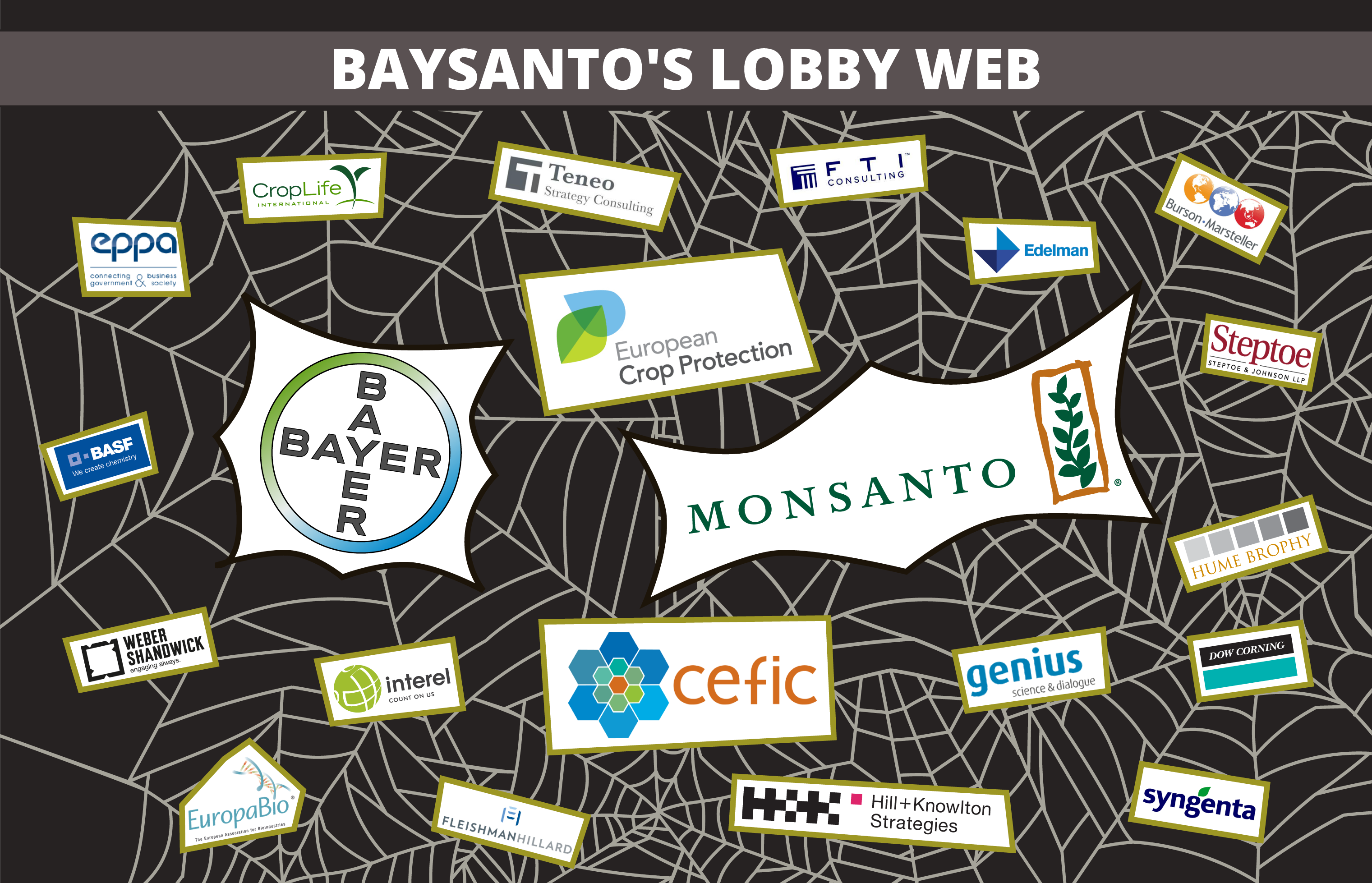
Entangled in the lobby web
Agribusiness corporations like Monsanto and Bayer have built a vast network of influencers to bend EU laws and safety standards in their favour. Lobby activities on their behalf are coordinated by lobby associations organised at global, regional and national level.
In Brussels, Monsanto and Bayer are represented by the seed lobby European Seed Association (ESA), pesticide lobby European Crop Protection Association (ECPA), biotech lobby EuropaBio and chemical lobby CEFIC. CEFIC alone employs around 135 staff and has an annual budget of 40 million euro, making it the single biggest lobby actor in the European Union!
In addition, they get specialised support from lobby consultancies and law firms like Fleishman Hillard, Weber Shandwick, FTI Consulting, Hume Brophy, Hill & Knowlton and Burson-Marsteller. The ‘Glyphosate Task Force’, led by Monsanto and managed by Hume Brophy, is dead set on achieving an extension of the market authorisation of highly toxic glyphosate-based weedkillers.
Both Monsanto and Bayer are also members of industry-funded science platforms like the International Life Sciences Institute (ILSI) or the European Centre For Ecotoxicology and Toxicology of Chemicals (ECETOC), which aim to skew the way products are approved in the industry’s favour. ‘Product defence companies’ like Exponent and Gradient Corp likewise pay scientists to cherry pick study data that is in their clients’ interest and for criticising independent study data that is not. Monsanto, Bayer, CEFIC and ECPA have all been using such services to defend cancer-causing and fertility-damaging crop protection products.
A food system under corporate control
Our food system is undoubtedly broken: Europe’s current model of farming and food consumption is destroying the planet and hurting people.
But agribusiness corporations like Bayer and Monsanto continue to promote an industrial model of agriculture that is destroying soils, water supplies, rural communities and biodiversity, and thereby slowly turning the Earth into a desert. Monsanto and Bayer are two of the most influential companies in this industry and the negative consequences of their activities are felt throughout the globe.
A merger between these two agribusiness giants would be catastrophic for people and planet. It would put more pesticides in our food and water, increase the amount of genetically-modified produce on our plates and endanger public health.
In addition, a merger of Bayer and Monsanto would increase the already massive corporate control over our food and farming systems and crush small-scale and independent farmers. It is in fact them, not big multinational actors like Bayer and Monsanto who are feeding the majority of people worldwide and are therefore the front-line defenders of global food security.
For years we have been fighting for a food system free from corporate control that provides pesticide free food, guarantees a decent living for small-scale farmers and ensures food sovereignty for all!
The planned merger goes against all of those principles. It is simply not safe to leave so much power in the hands of so few, especially when it affects something as essential as the food we eat.
We do not want pesticides in our food or GMOs on our plates! If we are to have any chance of reversing the harmful effects of industrial agriculture on our planet and food system, this merger must not be approved.
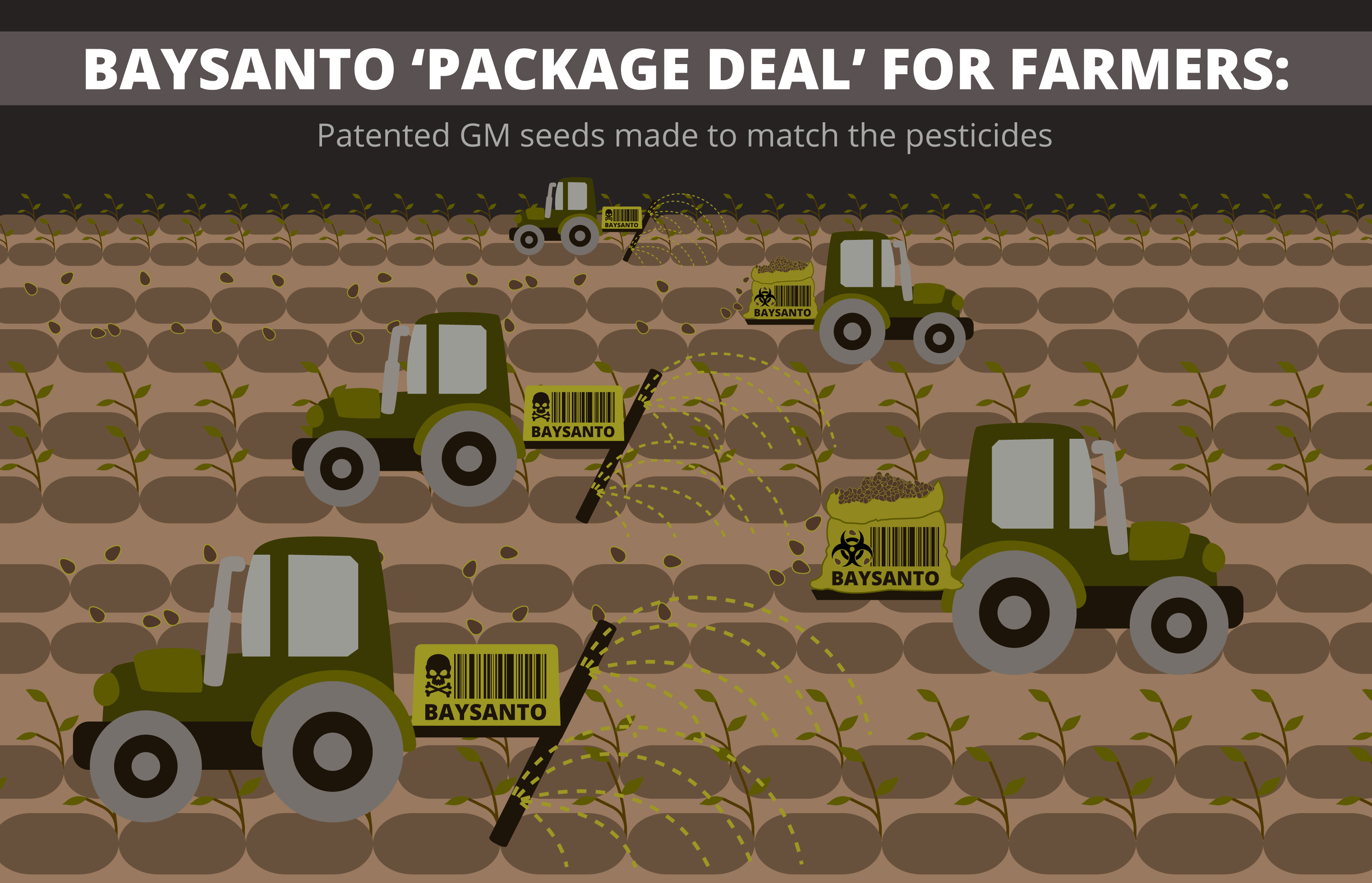
The package deal: patented, weedkiller-addicted GM crops
A substantial part of Bayer’s and Monsanto’s business comes from genetically-modified (GM) seeds that have been engineered to tolerate the companies’ herbicides.
Monsanto was the first to commercially launch weedkiller-tolerant crops with GM soy, maize and oilseed rape varieties made to withstand the toxic glyphosate component in its best-selling herbicide Roundup. Bayer produces its own range of GM varieties resistant to its broad-spectrum weedkiller ‘Liberty’, which contains glufosinate – a substance very similar to glyphosate.
To market these genetically modified seeds, corporations claim a reduction of pesticide quantities However, weedkiller-resistant crops have much increased use and quantities of herbicides, especially as many weeds have developed a resistance to glyphosate. As a consequence, farmers have been forced to spray more glyphosate-based as well as additional weedkillers. Monsanto, Bayer and other big agribusiness corporations have developed GM crops that can withstand several different herbicides, which are now necessary to control weed adaptation. This means many agricultural products will have been treated with multiple toxic herbicides before reaching consumers.
Also highly problematic are the high price and GM patents of herbicide-resistant crops, which force farmers to buy expensive seed licenses anew every season. But there are ever fewer alternatives as the monopolies of big agribusiness corporations like Monsanto, Bayer, Syngenta, Dow and DuPont make it increasingly difficult for farmers to choose non-GM and/ or non-patented seeds. Mergers of such companies only serve to give even more influence to these already powerful actors, trapping farmers in dependency.
The World Health Organisation considers glyphosate to be a probable cause of cancer in humans. Even though this link should mandate an EU ban of the substance, Bayer, for example, has demanded an exception for its highly toxic glyphosate-based herbicides for commercial reasons.
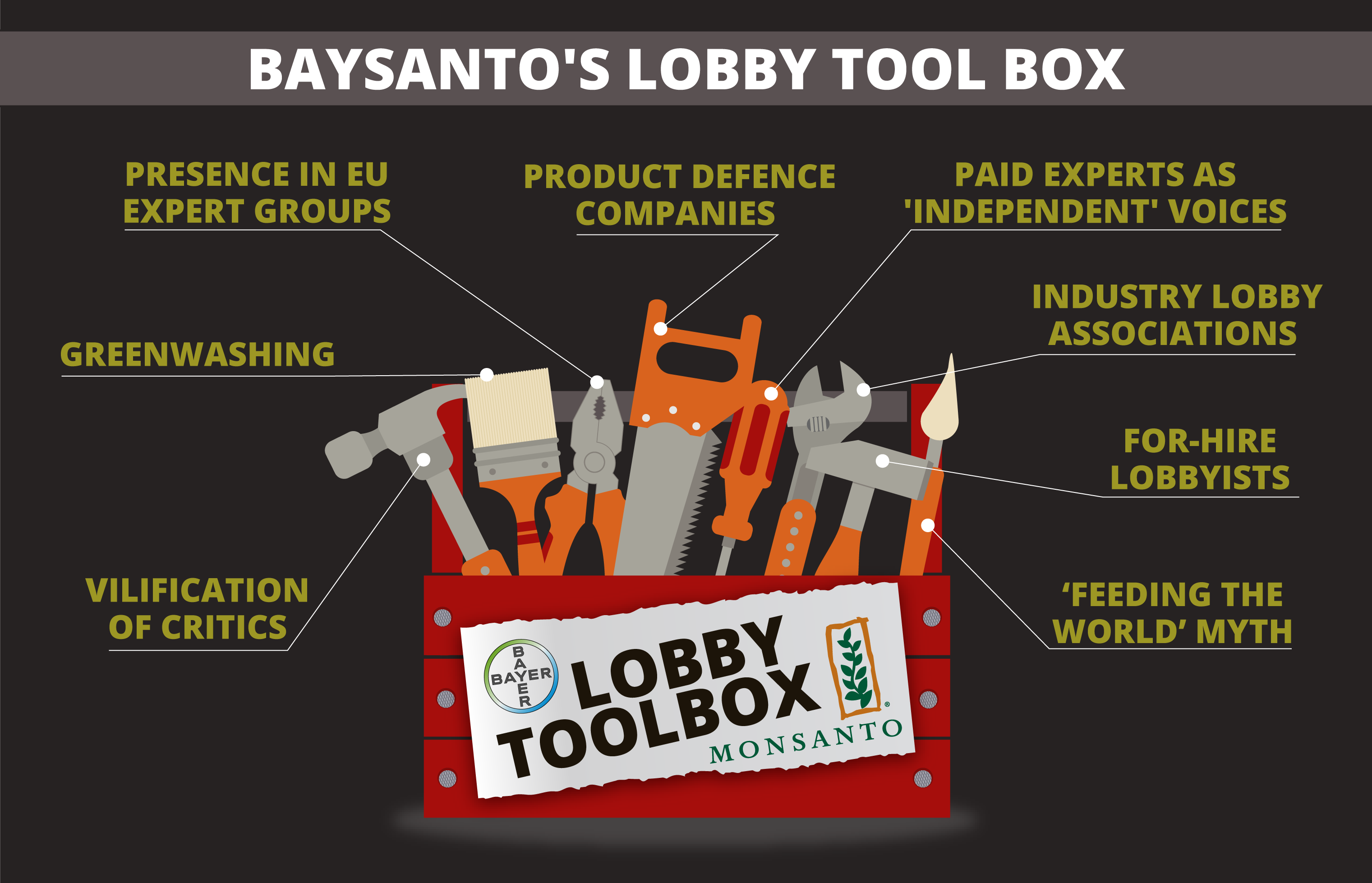
The BaySanto lobby tool box
Monsanto and Bayer use a wide range of lobby strategies to rig EU pesticide regulation in their favour. From direct lobbying to public relations spin and the corporate capture of science – no instrument in the lobby tool box appears too unethical for these two agribusiness giants.
Aside from joining forces with similar corporations in industry lobby associations, both Bayer and Monsanto pay huge sums to specialised lobby consultancies and law firms every year to boost their own influencing prowess and push industry-friendly alternatives to policy proposals. But their direct lobbying goes even further; many of the European Commission’s advisory expert groups feature several industry representatives who can shape policy recommendations from the get-go.
The public relations departments working for the companies do their bit to sideline health and environmental concerns around herbicides. They aggressively vilify critics, present the industry’s ultimate goal as ‘feeding the world’, and try their best to ‘greenwash’ the industry’s reputation by framing agribusiness corporations as innovators empowering farmers. More sinister yet, Bayer and Monsanto also co-opt scientific research to protect their profits: to ensure favourable study data, the pesticide producers initiate and monitor public-private research projects, fund scientists to echo their messages as 3rd party voices and hire product defence companies to publish studies that cast doubt on independent research findings.
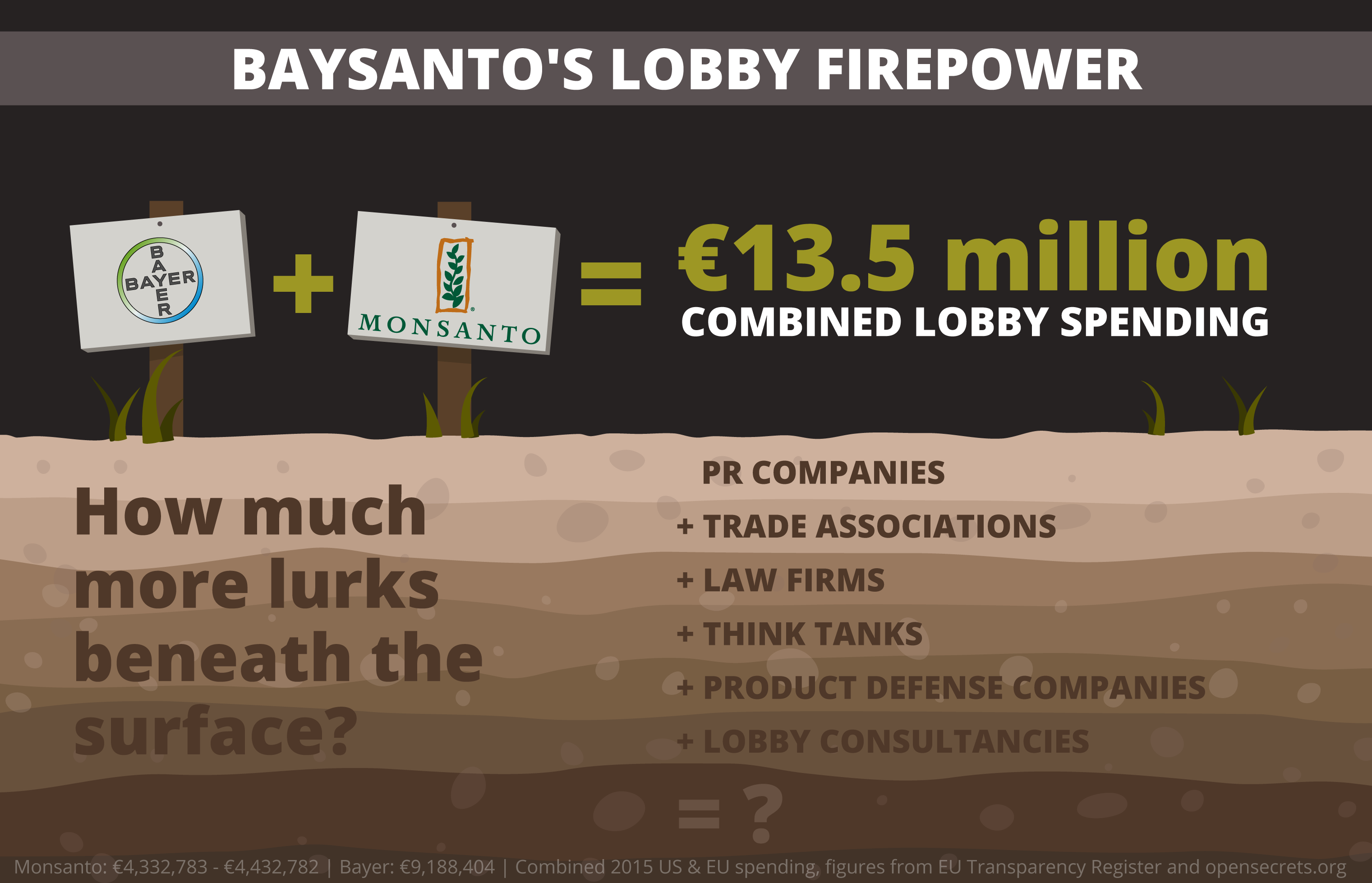
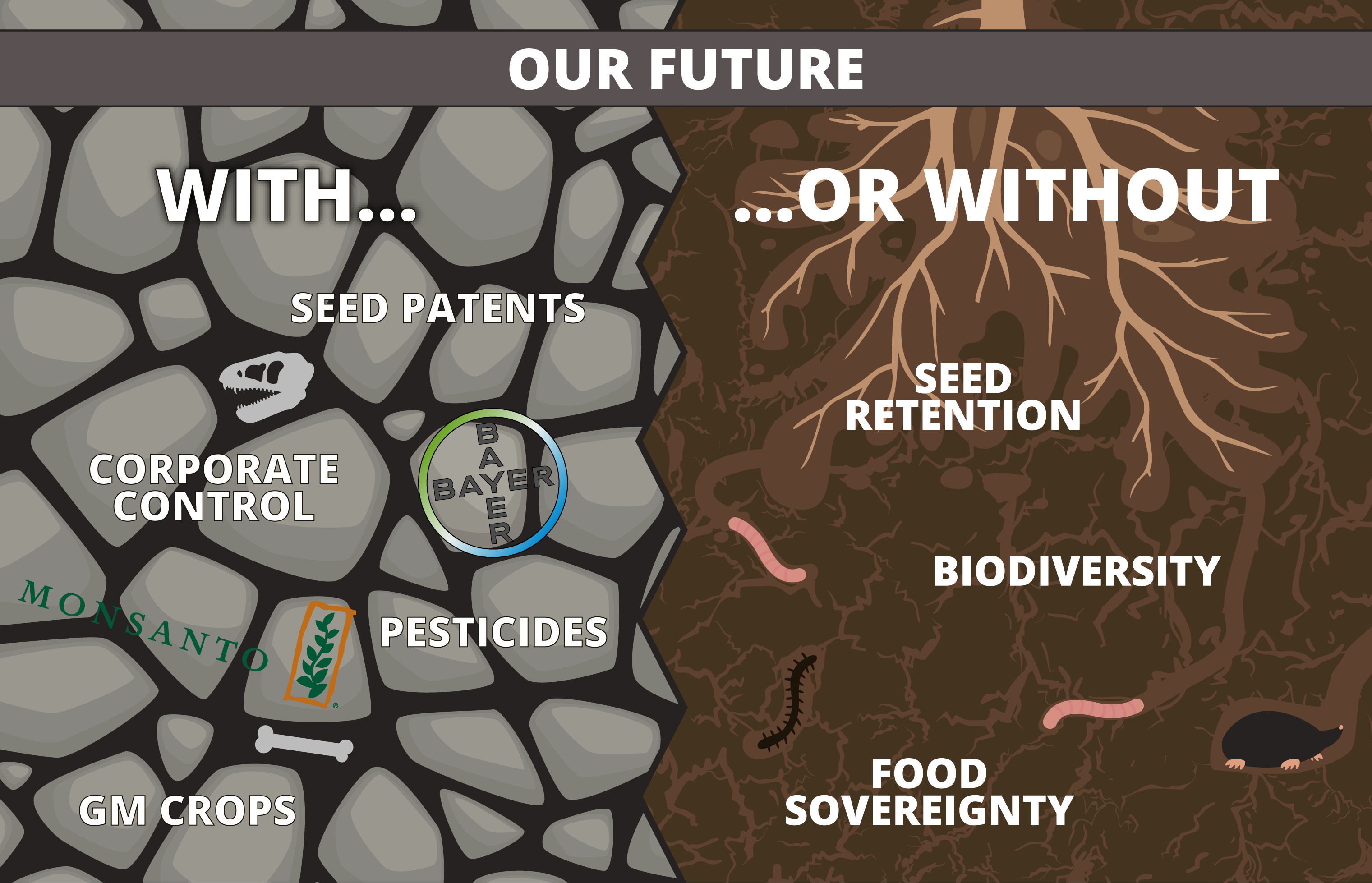

Comments
Does anyone have any information regarding the Bridging loan?
Mentioned in this article here:
http://www.cnbc.com/2016/09/14/bayer-and-monsanto-agree-to-merge.html
Bayer said Bank of America/Merrill Lynch, Credit Suisse, Goldman Sachs, HSBC and JP Morgan had committed to providing the bridge financing. Bank of America/Merrill Lynch and Credit Suisse are acting as lead financial advisers to Bayer, with Rothschild as an additional adviser. Bayer's legal advisers are Sullivan & Cromwell and Allen & Overy.
HSBC mentioned in this article here, of course it all needs checking for accuracy.
http://londonconversation.com/news/hsbc-corrupt-spencer-cameron-osborne/
Bayer, the company that brought the world Heroin, Zyklon B, Sarin and Neonicotinoids, and Monsanto, the company that brought us Glyphosate. Together they represent possibly the single greatest threat to life on earth. Thanks for reporting on these monsters.